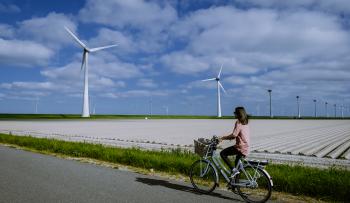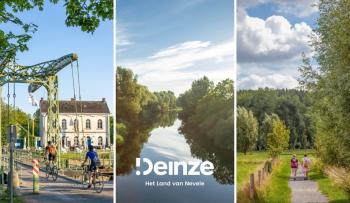
Reimagining the way we travel to address climate change: Cycling tourism as an ally
As world leaders negotiate how best to combat the climate crisis at COP26, ECF takes a look at how more cycling can help the tourism sector not only reduce its CO2 emissions, but also encourage biodiversity regeneration.
“Europe will not achieve its 2030 goals without urgent action during the next 10 years to address the alarming rate of biodiversity loss, increasing impacts of climate change and the overconsumption of natural resources.” This is the stark warning laid out in the European Environment State and Outlook Report (SOER 2020) reminding us that we must act effectively and act fast if we are to combat the climate crisis.
One of the biggest threats for biodiversity loss is climate change, and one of the major causes of climate change is biodiversity loss (as forests have the capacity to act as natural carbon sinks). To reverse this vicious cycle, actions towards decarbonisation and biodiversity restoration must be developed hand in hand.
In June 2021 the UN Decade for System Restoration, a global rallying cry to heal our planet, was launched to prevent, halt and reverse the degradation of ecosystems worldwide. Rethinking the way we move has an important role in addressing biodiversity loss. Transport causes 24% of global carbon emissions (1) and is a big cause of the pollution and environmental degradation that threatens biodiversity. It has also been estimated that tourism contributes 8% of carbon emissions (2).
Considering this crossover, there’s simply no way we can address climate change and think of a decarbonised future without changing the way we travel.
Changing the way we travel
Unsustainable travel patterns and carbon-based transport are not only threats to the planet and its environment, but also to the well-being of societies and communities. The negative effects of tourism models that do not acknowledge the limited capacity of natural resources and the undesirable impacts on local communities were present long before the pandemic.
An overconsumption of resources and an increase of pollution stresses ecosystems, forcing them to lose their capacity to recover. Not to mention the other side effects felt by communities, as unsustainable tourism can reduce the overall quality of life in places (overcrowded touristic areas, overpricing of housing, etc.).
But is it now possible to use the opportunity of a post-vaccine society to re-imagine the way we travel? Is it possible for tourism to not only reduce its detrimental environmental and social impact, but actually generate ripples of positivity by restoring life and ecosystems, supporting the creation of vibrant communities and boosting local economies?
More Cycling Tourism as an ally
In order to reimagine the way we travel in the “Decade on Ecosystem Restoration,” a good place to start is to travel in the greenest, smartest and most inclusive way possible. At the European Cyclists’ Federation (ECF), we are constantly working to increase the global levels of cycling, believing that it has the capacity to blend in perfectly with achieving a decarbonised, healthy, inclusive and green future.
Promoting more cycling tourism will not only help us change the way we travel but will also support biodiversity protection and restoration during our holidays. Thus, we must have more cycling in the global agenda, as it will improve conditions to get more people engaging with everyday cycling and leisure.
Cycling is a safe and healthy option that benefits us as individuals in many ways. Its benefits on a personal level go beyond physical exercise. Freedom, connection to nature, life-changing adventures are just some examples of how travelling by bike can contribute to a feeling of wellbeing, improving our social, physical and psychological health.
Cycling tourism can repurpose unused infrastructure, improve rural connectivity, bring life to remote areas and boost local economies. Especially when combined with public transport, cycling tourism can also notably reduce the carbon footprint of the tourism sector and can therefore bring us closer to a decarbonised future. This way of travelling helps to disperse tourism flows, extend the holiday season and access natural areas with a minimal impact. It has the capacity to support the regeneration of ecosystems and it is aligned with regenerative travel principles.
Changing the way we travel brings us closer to achieving the UN Sustainable Development Goals (SDGs) through rethinking tourism, developing sustainable mobility and encouraging a slow form of travel that leaves a positive impact on communities. Travelling by bike is a key activity for achieving the Tourism of Tomorrow, a tourism that cares for the communities and territories and respects the limits of the planet.
We have to act now to address the multiple crises we are facing, we have to act now to allow future generations and nature to thrive.
(1) https://www.iea.org/reports/tracking-transport-2020 (2) https://www.nature.com/articles/s41558-018-0141-x
Cover photo credit: Unsplash
Regions:
Contact the author
Recent news!
Contact Us
Avenue des Arts, 7-8
Postal address: Rue de la Charité, 22
1210 Brussels, Belgium









